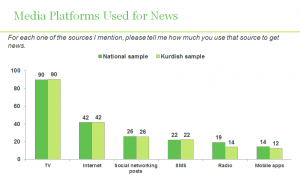New Research Findings on Turkey Reveal Kurdish Media Habits


WASHINGTON (July 29, 2014) — Kurdish media habits are similar to that of the national population of Turkey, according to media research data released today by the Broadcasting Board of Governors. Amidst reduced press freedoms, younger people across Turkey are looking toward the Internet and social media to consume news and information.
“Looking at the media environment today in Turkey, it is clear that the Voice of America is still critically needed,” said BBG Governor Ken Weinstein, adding that “freedom of the press in Turkey has been increasingly under attack for quite some time.”
Although the Turkish media market is highly developed, media outlets are subject to severe political pressure, and about a quarter of the population (23%) expressed some degree of dissatisfaction with the information provided by the media. In 2014, Freedom House for the first time ranked Turkey’s media as “Not Free,” and Reporters Without Borders now puts Turkey at #154 in media freedom, between Iraq and Gambia.
According to the Gallup World Poll, perceptions of media freedom are increasingly divided in Turkey; 65% of government supporters believe that Turkey has a lot of media freedom while only 20% of government critics believe that Turkey’s media are free.
Across Turkey, television remains the top choice for news (90% past-week use), but the Internet is very much in second place (42% past-week use) – including among the country’s Kurdish population, which the research took an in-depth look at for the first time.
 “There is a strong similarity of the Kurdish population to the national sample when you look at access to – and use of – media. It is almost identical as far as media platforms used for news,” said William Bell, director for audience insights at the International Broadcasting Bureau. The research also found that though nearly all of Turkey’s Kurdish population accesses the Internet in Turkish, 37% also access it in Kurdish and 21% in English. The BBG remains the only government-funded international broadcaster with a Kurdish service.
“There is a strong similarity of the Kurdish population to the national sample when you look at access to – and use of – media. It is almost identical as far as media platforms used for news,” said William Bell, director for audience insights at the International Broadcasting Bureau. The research also found that though nearly all of Turkey’s Kurdish population accesses the Internet in Turkish, 37% also access it in Kurdish and 21% in English. The BBG remains the only government-funded international broadcaster with a Kurdish service.
A research brief and presentation with further information about this data can be found here, and a video of the briefing will be added in the coming days. More information about the BBG’s media research series is available here.
